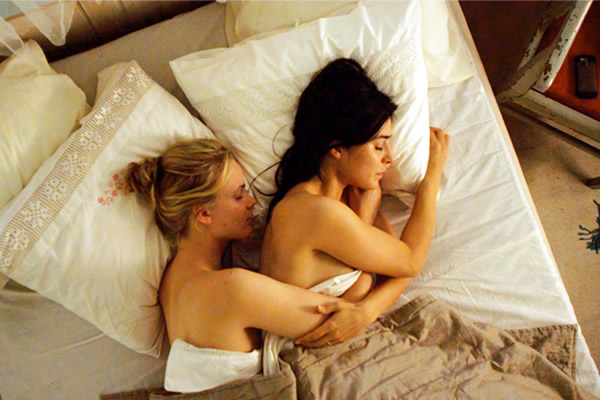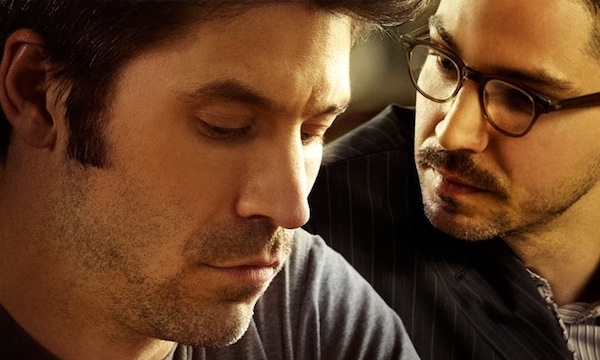Arts & Entertainment
Reel Affirmations opening night films
Festival kicks off Thursday with screenings of ‘Kiss Me’ and ‘I Do’

The Reel Affirmations International Film Festival kicks off Thursday night at 7 p.m. at the Carnegie Institution for Science (1530 P Street, NW) with screenings of “Kiss Me” at 7 p.m. and “I Do” at 9 p.m. Check back for reviews of all the weekend’s films, but we wanted to make sure you had a “heads up” on what to expect from the two opening night features. Visit reel affirmations.org for tickets.
“Kiss Me,” a 2011 piece that runs one hour, 45 mins. and is in Swedish with English subtitles, tells the unlikely love story of two step-sisters (don’t worry – they’re not related by blood). Frida is the daughter of Elisabeth and Mia is the daughter of Lasse. They meet at the elaborate 60th birthday party that Elisabeth throws for Lasse as a prelude to their upcoming nuptials.
Sparks quickly fly between the two women, and that’s when the trouble starts. Both women are in relationships. Mia is engaged to Tim and Frida is living with Elin. Both parents are understandably

A still from the film ‘Kiss Me.’ It screens Thursday night at 7 to open the Reel Affirmations LGBT film festival. (Still courtesy Reel Affirmations)
upset, and Mia is forced to finally admit her bisexuality.
And that’s the problem with this lovely movie. The plot covers difficult emotional terrain (and there are also unexplored melodramatic hints at other dark hidden family secrets), but every obstacles falls away relatively easily. It’s not always smooth sailing for the new couple, but there’s little doubt how the story will end. We also never get a clue how the family will maneuver the awkward introductions at Lasse and Elisabeth’s wedding.
But, that’s ultimately a quibble when watching this lovely film. This is a movie to savor, basking in the beautiful scenery and the fine performances. Writer and director Alexandra Therese Keining moves the action forward smoothly, not rushing the emotional moments, yet never wallowing in the messy situations. Cinematographer Ragna Jorming beautifully captures both urban and rural landscapes. Jorming manages to make a wide variety of scenes look absolutely stunning, from candlelit gatherings to moonlight swims to bracing confrontations in the harsh light of day.
The entire cast is uniformly strong, especially Ruth Vega Fernandez and Mia and Liv Mjönes as Frida. They are ably supported by Lena Endre as Elisabeth, Krister Henriksson as Lasse, Joakim Nätterqvist as Tim and especially Josefine Tengblad as Elin, who shines in her few brief scenes as Frida’s spurned girlfriend. It would have been great to see more of Mia’s kid brother Oskar (Tom Ljungman), who drops out of the movie far too quickly.
“Kiss Me” is a thoroughly enjoyable movie, comfortably navigating its way between the high drama of a Bergman classic and the low drama of a Lifetime made-for-TV movie. (Brian T. Carney)
“I Do,” a 94-minute U.S. drama from director Glenn Gaylord, is an indie film about Jack (David Ross), a gay British photographer in New York who faces a sticky romantic mess with his Spanish architect boyfriend, Mano (Maurice Compte) as they both face immigration challenges, deportation threats and familial demands.
“I Do” rides a solid and assured balance between slick, well-crafted feature with just a smidge of B-level melodrama to keep it from feeling too self important. A few sub-par performances from bit players and some heavy-handed plot turns keep things from fully jelling — one wonders what a director like Steven Soderbergh or even Tom Ford might have done with the material — yet it remains a fully watchable and heart-tugging tale that mostly effectively dramatizes the unfair stress binational gay couples often face.
Writer/producer David Ross will appear for a Q&A after the screening, which will be moderated by Steve Ralls, director of communications at Immigration Equality. (Joey DiGuglielmo)
Photos
PHOTOS: Montgomery County Pride in the Plaza
LGBTQ celebration held in downtown Silver Spring

Montgomery County Pride in the Plaza was held on Sunday, June 29 at Veterans Plaza in Silver Spring, Md.
(Washington Blade photos by Michael Key)























The fifth annual Fredericksburg Pride march and festival was held on Saturday, June 28. A march through the streets of downtown Fredericksburg, Va. was followed by a festival at Riverfront Park.
(Washington Blade photos by Michael Key)



















India
Anaya Bangar challenges ban on trans women in female cricket teams
Former Indian cricketer Sanjay Bangar’s daughter has received support

Anaya Bangar, the daughter of former Indian cricketer Sanjay Bangar, has partnered with the Manchester Metropolitan University Institute of Sport in the U.K. to assess her physiological profile following her gender-affirming surgery and undergoing hormone replacement therapy.
From January to March 2025, the 23-year-old underwent an eight-week research project that measured her glucose levels, oxygen uptake, muscle mass, strength, and endurance after extensive training.
The results, shared via Instagram, revealed her metrics align with those of cisgender female athletes, positioning her as eligible for women’s cricket under current scientific standards. Bangar’s findings challenge the International Cricket Council’s 2023 ban on transgender athletes in women’s cricket, prompting her to call for a science-based dialogue with the Board of Control for Cricket in India and the ICC to reform policies for trans inclusion.
“I am talking with scientific evidence in my hand,” Bangar said in an interview posted to her Instagram page. “So, I hope, this makes an impact and I will be hoping to BCCI and ICC talking with me and discussing this further.”
On Nov. 21, 2023, the ICC enacted a controversial policy barring trans women from international women’s cricket. Finalized after a board meeting in Ahmedabad, India, the regulation prohibits any trans player who has experienced male puberty from competing, irrespective of gender-affirming surgery or hormone therapy. Developed through a 9-month consultation led by the ICC’s Medical Advisory Committee, the rule aims to safeguard the “integrity, safety, and fairness” of women’s cricket but has drawn criticism for excluding athletes like Canada’s Danielle McGahey, the first trans woman to play internationally. The policy, which allows domestic boards to set their own rules, is slated for review by November 2025.
Bangar shared a document on social media verifying her participation in a physiological study at the Manchester Metropolitan University Institute of Sport, conducted from Jan. 20 to March 3, 2025, focused on cricket performance. The report confirmed that her vital metrics — including hemoglobin, blood glucose, peak power, and mean power — aligned with those of cisgender female athletes. Initially, her fasting blood glucose measured 6.1 mmol/L, slightly above the typical non-diabetic range of 4.0–5.9 mmol/L, but subsequent tests showed it normalized, reinforcing the study’s findings that her physical profile meets female athletic standards.
“I am submitting this to the BCCI and ICC, with full transparency and hope,” said Bangar. “My only intention is to start a conversation based on facts not fear. To build space, not divide it.”
In a letter to the BCCI and the ICC, Bangar emphasized her test results from the Manchester Metropolitan University study. She explained that the research aimed to assess how hormone therapy had influenced her strength, stamina, hemoglobin, glucose levels, and overall performance, benchmarked directly against cisgender female athletic standards.
Bangar’s letter to the BCCI and the ICC clarified the Manchester study was not intended as a political statement but as a catalyst for a science-driven dialogue on fairness and inclusion in cricket. She emphasized the importance of prioritizing empirical data over assumptions to shape equitable policies for trans athletes in the sport.
Bangar urged the BCCI, the world’s most influential cricket authority, to initiate a formal dialogue on trans women’s inclusion in women’s cricket, rooted in medical science, performance metrics, and ethical fairness. She called for the exploration of eligibility pathways based on sport-specific criteria, such as hemoglobin thresholds, testosterone suppression timelines, and standardized performance testing. Additionally, she advocated for collaboration with experts, athletes, and legal advisors to develop policies that balance inclusivity with competitive integrity.
“I am releasing my report and story publicly not for sympathy, but for truth. Because inclusion does not mean ignoring fairness, it means measuring it, transparently and responsibly,” said Bangar in a letter to the BCCI. “I would deeply appreciate the opportunity to meet with you or a representative of the BCCI or ICC to present my findings, discuss possible policy pathways, and work towards a future where every athlete is evaluated based on real data, not outdated perceptions.”
Before her transition, Bangar competed for Islam Gymkhana in Mumbai and Hinckley Cricket Club in the U.K., showcasing her talent in domestic cricket circuits. Her father, Sanjay Bangar, was a dependable all-rounder for the Indian national cricket team from 2001 to 2004, playing 12 test matches and 15 One Day Internationals. He later served as a batting coach for the Indian team from 2014 to 2019, contributing to its strategic development.
Cricket in India is a cultural phenomenon, commanding a fanbase of more than 1 billion, with more than 80 percent of global cricket viewership originating from the country.
The International Cricket Council, the sport’s governing body, oversees 12 full member nations and more than 90 associate members, with the U.S. recently gaining associate member status in 2019 and co-hosting the 2024 ICC Men’s T20 World Cup. The BCCI generated approximately $2.25 billion in revenue in the 2023–24 financial year, primarily from the Indian Premier League, bilateral series, and ICC revenue sharing. The ICC earns over $3 billion from media rights in India alone for the 2024–27 cycle, contributing nearly 90 percent of its global media rights revenue, with the BCCI receiving 38.5 percent of the ICC’s annual earnings, approximately $231 million per year.
Women’s cricket in India enjoys a growing fanbase, with over 300 million viewers for the Women’s Premier League in 2024, making it a significant driver of the sport’s global popularity. The International Cricket Council oversees women’s cricket in 12 full member nations and over 90 associate members, with the U.S. fielding a women’s team since gaining associate status in 2019 and competing in ICC events like the 2024 Women’s T20 World Cup qualifiers. The BCCI invests heavily in women’s cricket, allocating approximately $60 million annually to the WPL and domestic programs in 2024–25, while contributing to the ICC’s $20 million budget for women’s cricket development globally. India’s media market for women’s cricket, including WPL broadcasting rights, generated $120 million in 2024, accounting for over 50 percent of the ICC’s women’s cricket media revenue.
“As a woman, I feel when someone says that they are women, then they are, be trans or cis. A trans woman is definitely the same as a cis woman emotionally and in vitals, and specially, when someone is on hormone replacement therapy. Stopping Anaya Bangar from playing is discrimination and violation of her rights. It is really sad and painful that every trans woman need to fight and prove their identity everywhere,” said Indrani Chakraborty, an LGBTQ rights activist and a mother of a trans woman. “If ICC and BCCI is stopping her from playing for being transgender, then I will say this to be their lack of awareness and of course the social mindsets which deny acceptance.”
Chakraborty told the Blade that Bangar is an asset, no matter what. She said that the women’s cricket team will only benefit by participation, but the discriminating policies are the hindrance.
“Actually the transgender community face such discrimination in every sphere. In spite of being potent, they face rejection. This is highly inhuman. These attitudes is regressive and will never let to prosper. Are we really in 2025?,” said Chakraborty. “We, our mindset and the society are the issues. We, as a whole, need to get aware and have to come together for getting justice for Anaya. If today, we remain silent, the entire community will be oppressed. Proper knowledge of gender issues need to be understood.”
The BCCI and the International Cricket Council have not responded to the Blade’s repeated requests for comment.





















